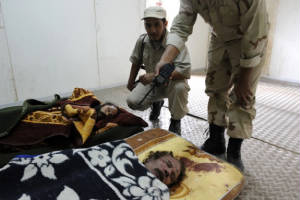|

Many Libyans may be celebrating the killing of Muammar al-Qaddafi,
but you'd better believe that Western governments are breathing a sigh of relief themselves.
Whether the NATO countries -- who had only a few years ago
welcomed Col. Muammar al-Qaddafi back into the international fold in exchange for his renouncing his chemical and nuclear
weapons programs and allowing U.S. and British experts to come and help dismantle them -- played any role in what certainly appeared in first reports
from the scene to have been the summary execution of the Libyan dictator will probably never be known. What the video evidence
does prove is that the Libyan revolutionary forces did not find him already dead or killed by a NATO airstrike; nor does the
initial claim that he was killed in "crossfire" between insurgent forces and diehard regime loyalists stand up to even the
most minimal scrutiny.
NATO does acknowledge that its planes bombarded the convoy in
which Qaddafi was fleeing the city of Sirte shortly before it was intercepted on the ground by the insurgents, but it has
denied it even knew he was there. If that is true, and the French, British,
and Americans did not try to make their own luck, then they certainly were very lucky indeed.
Qaddafi was, quite simply, a man who knew too much. Taken alive,
he would have almost certainly have been handed over to the International Criminal Court (ICC), which had indicted him -- along with his son, Saif al-Islam, and brother-in-law and
military intelligence chief Abdullah Senussi (whereabouts unknown) -- for crimes against humanity in late June. Imagine the
stir he would have made in The Hague. There, along with any number of fantasies and false accusations, he would almost certainly
have revealed the extent of his intimate relations with French President Nicolas Sarkozy and British Prime Minister Tony Blair,
the details of his government's collaboration with Western intelligence services in counterterrorism, with the European Union
in limiting migration from Libyan shores, and in the granting of major contracts to big Western oil and construction firms.
He would have had much to tell, for this cooperation was extensive.
In the war against the jihadis -- a war to which Qaddafi regularly claimed to be as committed to prosecuting as Washington,
Paris, or London -- links between Libyan intelligence and the CIA were particularly strong, as an archive of secret documents
unearthed by Human Rights Watch researchers has revealed. If anything, the CIA's British counterpart, MI6, was even more
involved with the Qaddafi family. As the Guardian reported in early September, it was Sir Mark Allen, then the director
of the counterterrorism section of MI6, the British overseas spying agency, who was the key figure on the Western side in
the secret negotiations to get Qaddafi to give up his WMD programs. The Guardian story further laid out how, after
failing to become director of MI6 in 2004, Allen went into the private sector, becoming a senior advisor to the Monitor Group,
a consulting firm that was paid huge fees by Qaddafi to burnish his image around the world, and, while they
were at it, helped Saif (who had been his father's initial envoy to MI6) research his PhD thesis for the London School of
Economics (LSE). Allen was also an advisor to BP, helping the oil giant secure major contracts in Libya from the Qaddafi regime.
The idea that Allen was the only senior Western official to
establish such close ties with the Libyan dictator and his family is ludicrous. To the contrary, both the British and French
governments were soon falling all over themselves to curry favor with a newly "respectable" Qaddafi. The Daily Mail
reproduced a facsimile of the letter that, while prime minister, Tony Blair wrote to Saif Qaddafi to help him with his research for his LSE doctorate.
Both during Blair's premiership and that of his successor, Gordon Brown, Britain aggressively pursued sales of military equipment,
up to and including warships, to the Libyan regime, and sent members of the elite Special Air Service (SAS, the equivalent
of the U.S. Delta Force) to help train Qaddafi's forces in counterterrorism tactics. Not to be outdone, Sarkozy, to the consternation
even of many members of his own cabinet, invited Qaddafi to Paris in Dec. 2007, for an official state visit, the upshot of which was billions of dollars in contracts from
Libya won by French firms.
|

